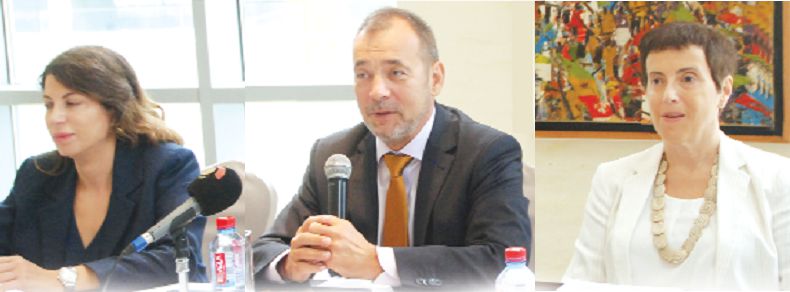
Appointment of EC Chair: Consider broader consultations - EU suggest to Ghana
The European Union (EU) has called on Ghana to reconsider the procedure for selecting the Chairperson of the Electoral Commission (EC) and other top officials of the commission to deepen the country's democratic credentials.
The leader of the EU Election Follow-up Mission (EFM) to Ghana, Mr Tamas Meszerics, who made that call, said a more consultative procedure for selecting the leaders of the EC would make the officials more acceptable to all stakeholders and boost public confidence in the electoral system.
Advertisement
Currently, Article 70(2) of the 1992 Constitution clothes the President with the power to appoint the Chairperson of the EC in consultation with the Council of State.
However, the EU’s EFM leader said there was still the need to make the selection process more consultative by roping in key stakeholders, especially the political parties.
"We believe that reforming the processes around and within the EC and the electoral system is a major concern, notably the selection mechanism of the top officials.
"We all know that the constitution requires the President to appoint the Chairperson to the EC, but nevertheless, we believe that there could be a number of ways that the selection of the officials will be made more inclusive and, therefore, acceptable and satisfactory to all political actors, and this must be looked at critically," he said.
EFM engagement
He made the call at a press briefing that preceded a stakeholder roundtable discussion on reforming the electoral system in Accra yesterday.
The event was organised to discuss the extent to which the country had implemented the findings and recommendations of the EU Election Observer Team that observed the 2016 elections.
The EFM was deployed to the country on September 5, this year, to engage with policy makers and stakeholders in the electoral process to assess the extent of implementation of the recommendations and the way forward.
While in Ghana, the team met with key stakeholders such as the EC, the leadership of Parliament, political parties, constitutional bodies, government agencies, civil society organisations (CSOs) and the international community.
High point
Mr Meszerics described the engagement with the stakeholders as largely successful and commended the country for showing a positive attitude towards the implementation of the recommendations of the EU election observer team.
He further commended Ghana for passing the Right to Information (RTI) Law, pointing out that an effective implementation of that law was critical to ensuring transparency in the electoral system and deepening democratic governance.
"We encourage all authorities and stakeholders to follow the implementation of the law closely and use it actively to better the electoral process and make it transparent," he said.
The EU EFM leader said the team was impressed with the number of reforms that had been undertaken in the aftermath of the 2016 elections with a view to improving the electoral system.
More consultation
However, he called for more stakeholder consultation, particularly, between the EC and the political parties, to consolidate the gains.
"We will like to encourage strongly all the electoral stakeholders to engage in good faith and in extensive consultation to achieve bi-partisan consensus and create an environment that is conducive for a great level of public confidence in the electoral process," he said.
Mr Meszerics emphasised the need for greater engagement between the EC and the political parties through effective communication and mutual respect for the political actors.
For instance, he said, the EC must put in place mechanisms to constantly update its website with relevant information and also create an atmosphere for sharing ideas on the electoral process with political parties.
Campaign legislation
Me Meszerics also called for a legislation that would clearly define the period for campaign activities in the country.
He noted that the lack of a clear legal framework regulating the period for campaigning was not helpful.
"We believe that legislating the period for campaigning can be easily done through statutory changes. This will help to address a number of issues surrounding transparency and tranquillity leading to elections, because if you know when the actual campaign period is, it is easy to regulate what can or cannot be done or what needs to be done," he said.
Election resolution
Mr Meszerics noted that more work needed to be done to improve the election dispute resolution process.
He said although there was a procedure for election dispute resolution, the architecture appeared to be quite cumbersome and needed to be made more flexible.
The EFM team leader also underscored the need for more to be done to make the election process more friendly for women to participate.
He urged the appropriate stakeholders to see to the urgent passage of the Affirmative Action Bill to facilitate the participation of women in the political system.
Consolidation
The Ambassador and Head of the EU Delegation, Ms Diana Acconcia, commended Ghana for making strides in democratic governance.
She said the active participation of various stakeholders in the governance process was ample evidence of a more democratically political system in the country.
However, she urged the country not to be complacent with the current status as a democratic country but to rather strive to do more.
"Ghana has had relatively peaceful elections and it is commendable; but democracy is work in progress and so you need to continue working at it," she said.




